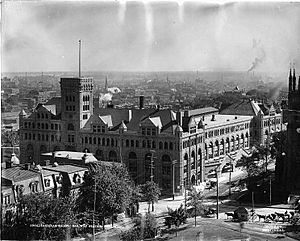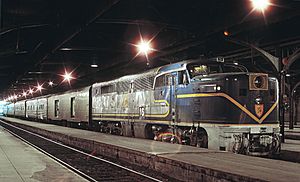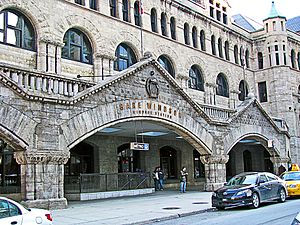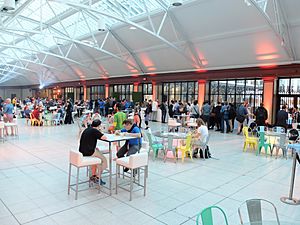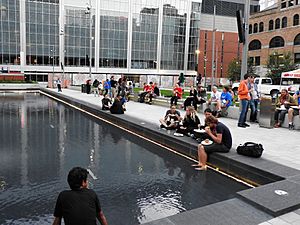Windsor Station (Montreal) facts for kids
Quick facts for kids Windsor Station |
|
|---|---|
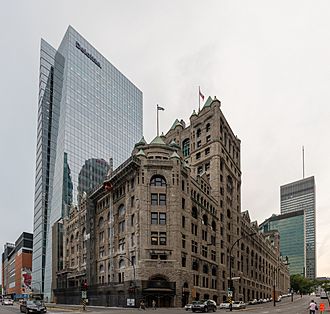
Windsor Station in 2017
|
|
| General information | |
| Type | Office building, and formerly train station |
| Architectural style | Richardsonian Romanesque |
| Location | Montreal, Quebec, Canada |
| Address | 1160 Canadiens-de-Montréal avenue (formerly 1160 de la Gauchetière street) (concourse), 1100 Canadiens-de-Montréal avenue (offices) |
| Coordinates | 45°29′50.86″N 73°34′7.18″W / 45.4974611°N 73.5686611°W |
| Construction started | 1887 |
| Completed | 1889, 1916 |
| Cost | CA$2 million (1888–89) |
| Owner | Cadillac Fairview |
| Design and construction | |
| Architect | Bruce Price |
| Awards and prizes | Heritage railway station (Historic Sites and Monuments Board of Canada) |
| Official name: Windsor Station (Canadian Pacific) National Historic Site of Canada | |
| Designated: | 1975 |
|
Heritage Railway Station (Canada)
|
|
| Designated: | 1990 |
| Type: | Historic monument |
| Designated: | 2009 |
Windsor Station is a famous building in Montreal, Quebec, Canada. It used to be a busy train station and the main office for the Canadian Pacific Railway (CPR). From 1889 to 1996, it was the company's headquarters.
The building is surrounded by important streets. To the north is avenue des Canadiens-de-Montréal, to the east is Peel Street, and to the south is Saint Antoine Street. The Bell Centre is located to its west.
Windsor Station is recognized as a very important place. It became a National Historic Site of Canada in 1975. In 1990, it was named a Heritage Railway Station. Later, in 2009, it became a provincial historic monument.
The building's walls are made of gray limestone. This stone came from a quarry right in Montreal. Outside, some of the large columns are over 2 meters (7 feet) wide.
Building a Landmark: Windsor Station's History
Early Days and Design
In 1887, the Canadian Pacific Railway (CPR) started building a new train station in Montreal. This station would also be their main office. It was built three years after another station, the Dalhousie Station.
A New York City architect named Bruce Price designed Windsor Station. He chose a style called Romanesque Revival. This style uses round arches and strong, heavy stone. Price had to change his plans four times before CPR approved them.
Construction and First Trains
The station cost about CA$300,000 to build in 1889. The very first trains left Windsor Station on February 4, 1889. It was first called Windsor Street Station. This was because it was located on Windsor Street, which is now called Peel Street.
Growing Bigger: Station Expansions
The station needed more space as it got busier. It was made larger for the first time between 1900 and 1903. Canadian architects worked on this expansion.
Another expansion happened from 1910 to 1913. The third big change came in 1916. This included adding a tall, fifteen-story tower. This tower changed the look of Montreal's skyline. Brothers Edward and William Maxwell, who were famous architects, led this project.
A Hub for Travel
Windsor Station was a key part of Dominion Square. It helped many passengers travel and connected to other types of transport. The building was located between Peel Street and avenue des Canadiens-de-Montréal. It had four floors on one side and five floors on another. This was because the ground sloped downwards.
Plans for Change and Abandonment
In July 1970, CPR announced big plans. They wanted to tear down Windsor Station. Their idea was to build a 60-story office building there. This new building would have cost CA$250 million. The same architects who designed New York City's World Trade Center were to design it. However, after many delays, the project was never built.
Trains Move On: Via Rail and Commuter Services
Via Rail started in 1978. It took over running passenger trains for both Canadian National (CN) and CPR. At first, trains still used their old stations. But by 1979, most of Via's trains that used Windsor Station moved. They went to CN's Central Station. This included long-distance trains like The Atlantic Limited and The Canadian.
Some local trains, called Dayliners, continued to use Windsor Station until 1984. The daily train from Montreal to New York City, the Adirondack, also used Windsor Station until 1986. Both of these services then moved to Central Station. Other local trains to Ottawa and Mont-Laurier stopped using Windsor Station in 1981.
After long-distance trains left, Windsor Station still served local commuter trains. These trains were for people traveling to and from nearby towns. In 1999, a new line to Blainville was added. In 2001, another line to Delson started.
New Arena, New Station
In 1993, work began on the Molson Centre. This is now known as the Bell Centre. It is a hockey arena built next to Windsor Station. The arena was built on the train tracks that led to the station. This meant Windsor Station could no longer connect to the railway.
The Molson Centre opened in March 1996. A new train station, Lucien-L'Allier Station, opened nearby. It replaced Windsor Station for commuter trains. Until 2001, the new station was called Terminus Windsor. Its name was changed to avoid confusion and link it to the Lucien-L'Allier metro (subway) station. You can still walk through the Bell Centre to get to Windsor Station and the metro.
Windsor Station was the western end of CPR's downtown train lines. Its eastern end was Place Viger.
CPR Headquarters Move
Windsor Station was also the main office for CPR and its parent company. But in the mid-1990s, CPR changed its business. It sold or stopped using most of its tracks east of Montreal. The company decided to focus on its operations in Western Canada. In 1996, CPR moved its headquarters to Calgary.
Windsor Station Today
Since 1993, Windsor Station has not been connected to the railway system. CPR sold the building to Cadillac Fairview in 2009. Because of this, it became a provincial heritage site that same year.
Today, part of Windsor Station is an office complex. It also has some restaurants and cafés. The large main hall inside is open to the public. People can rent it for special events and parties.
The lower floor of the station is part of Montreal's RÉSO. This is a network of underground tunnels. It connects the Bonaventure metro station to the Lucien-L'Allier commuter train station. It also connects to the Bell Centre. The 13 train tracks that once led into Windsor Station are gone. In their place, there is now a public square.
See also
- Angel of Victory, a statue found in the station
- Drury's
- The Adirondack, one of the last long-distance trains to use this station
 | Dorothy Vaughan |
 | Charles Henry Turner |
 | Hildrus Poindexter |
 | Henry Cecil McBay |


